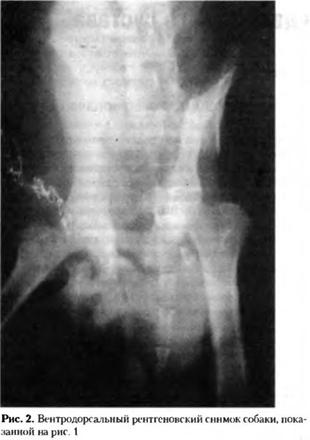Gene: [17q2/SCN4A] sodium channel, voltage-gated, type IV, alpha polypeptide (adult muscle); hyperkalemic periodic paralysis (HYPP; Gamstorp disease; myotonia; adynamia episodica hereditaria); paramyotonia congenita (of von Eulenburg; MIM:168300); [HYPP HYKPP ]
|
HET |
Electrophysiological, biochemical and linkage studies suggest that symptoms of both hyperkalemic periodic paralysis (MIM:170500) and paramyotonia congenita (MIM:168300) (Lehman-Horn-1983,1987,1991) may be attributed to the congenital disturbances in the function of the skeletal muscle sodium channel. See also GEM:01q32/CACNA1S." |
|
PAT |
Paramyotonia congenita (PC) (paralysis periodica paramyotonica) was first described by von Eulenburg (Neurol Zentralbl, 5, 265-272, 1886). The 6 main features are: autosomal dominant inheritance with high penetrance; myotonia, increased by cold exposure; intermittent flaccid paresis; lability of serum potassium; nonprogressive nature; lack of atrophy or hypertrophy of muscles. The disease do not affect social adaptability or longevity. Symptoms are usually noticed within the first weeks of life. Following exposure to cold, patients develop stiffness of the face or fingers (cold-induced myotonia). Exercise of the exposed muscles increases the stiffness and is followed by localised muscle weakness. After rewarming, the muscle strength gradually returns within hours. Some patients occasionally experience attacks of weakness without exposure to cold (periodic paralysis). During paralytic attacks, the legs are mainly affected, although muscle weakness can be generalized; paramyotonic stiffness is lacking. All patients show myotonia on electromyographic investigation. Electrophysiological studies on muscle fibres from patients with PC show an abnormal temperature dependence of the sodium channel in the muscle fibre. Cold-induced weakness is caused by a disturbance in the gating mechanism of the tetrodotoxin sensitive sodium chanell. This abnormality results in depolarisation and subsequent inexcitability of the muscle fibre (Rudel-1985; Lehmann-Horn-1981,1987a)." |
|
MUT |
Experiments on hybridisation of the DNA fragments from 114 affected individuals, sampled from 17 families with paramyotonia congenita, with 2 cDNA probes corresponding to parts of SCN4A (17q23.1-25.3) and of growth hormone (17q22-24) genes revealed the extremely close linkage of the paramyotonia congenita phenotype with both each probe and combined haplotype of the two. No recombination event between the markers and paramyotonia congenita was observed. The segregation analysis under the assumptions of autosomal dominant inheritance with 100% penetrance of the paramyotonia supported the inference about tight linkage (RFE:Koch-1991b). Therefore, both hyperkalemic periodic paralysis and paramyotonia congenita are diseases of the same muscle sodium channel, being caused by allelic mutations (Fontaine-1990; Koch-1991a,b)." |
|
LIN |
Loci: GEM:17q2/GH1.
[1] PMC is tightly linked with 17q2/GH1." |
|
REF |
LOC "Bennani-Baiti IM &: Genomics, 29, 647-652, 1995 PAT "Engel: (in) Engel & (eds.) Myology, McGraw-Hill, NY, 1843-1870, 1986 PAT,LIN "Fontaine B &: Science, 250, 1000-1002, 1990 HIS,PAT "Gamstorp I &: Acta Neurol Scand, 39, 41-58, 1963 HIS,PAT "Gamstorp I &: Acta Paediatr, 45 (suppl 108), 1-126, 1956 LOC "George AL &: Genomics, 9, 555-556, 1991 MUT "Heine R &: Hum Mol Genet, 2, 1349-1353, 1993 PAT,LIN "Hogervorst F &: Eur J Biochem, 199, 425-433, 1991 MUT "Koch MC &: Neuroreport, 6, 2001-2004, 1995 ASS "Koch MC &: J Med Genet, 28, 583-586, 1991a HET,LIN "Koch MC &: Hum Genet, 88, 71-74, 1991b MUT,PAT "Lehmann-Horn &: Pflugers Arch, 418, 297-299, 1991 MUT,PAT "Lehmann-Horn &: Muscle Nerve, 10, 363-374, 1987 MUT,PAT "Lehmann-Horn &: Muscle Nerve, 6, 113-121, 1983 POL,HET "McClatchey AI &: AJHG, 50, 896-901, 1992a MUT "McClatchey AI &: Cell, 68, 769-774, 1992b MUT "McClatchey AI &: Nature Genet, 2, 148-152, 1992c MUT "Ptacek LJ &: Neurology, 44, 1500-1503, 1994 MUT "Ptacek LJ &: Ann Neurol, 33, 300-307, 1993 MUT "Ptacek LJ &: Neurology, 42, 431-433, 1992a MUT "Ptacek LJ &: Neuron, 8, 891-897, 1992b LOC,REL "Ptacek LJ &: AJHG, 49, 851-854, 1991a MUT "Ptacek LJ &: Cell, 67, 1021-1027, 1991b MUT "Sillen A &: Genet Couns, 7, 267-275, 1996 MUT "Tahmoush AJ &: Neuromuscul Disord, 4, 447-454, 1994 CLO,SEQ,GEN "Wang JZ &: BBRC, 182, 794-801, 1992 MUT "Yamada T &: J Neurol Sci, 133, 192-193, 1995 |
|
KEY |
neu, sign, mem, myo, ion |
|
CLA |
coding, basic |
|
LOC |
17 q23-25 |
|
MIM |
MIM: 170500 |
|
SYN |
HYPP HYKPP |
